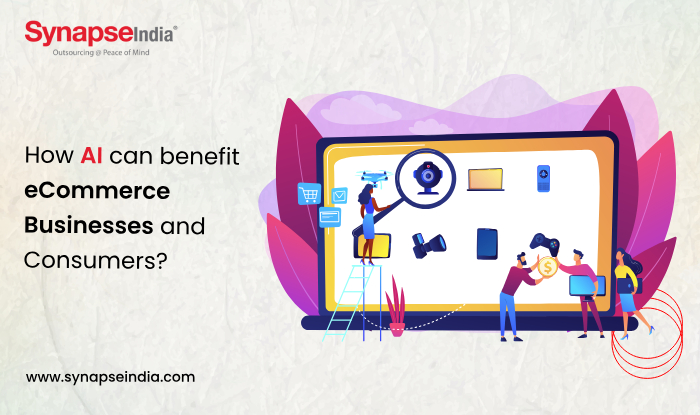 20 Jun 2024
20 Jun 2024“Artificial Intelligence (AI) is revolutionizing the eCommerce industry by enhancing personalized shopping experiences, streamlining customer service, optimizing inventory management, and detecting fraud.”

AI is increasingly spreading and becoming a part of everyday life. Artificial Intelligence (AI) has emerged as a game-changer in the e-commerce industry, revolutionizing the way businesses operate and enhancing the shopping experience for consumers. With its ability to analyze vast amounts of data, automate processes, and personalize interactions, AI is reshaping every aspect of the e-commerce landscape. In this blog, we will explore the myriad ways in which AI is benefiting both e-commerce businesses and consumers, driving innovation, efficiency, and customer satisfaction.

Artificial intelligence (AI) in e-commerce refers to a broad range of technologies and methods that use machine learning and artificial intelligence to improve several facets of online shopping. Natural language processing (NLP) is a crucial technology that allows e-commerce platforms to comprehend and interpret human discourse. Artificial Neural Processing (NLP) drives chatbots and virtual assistants that offer tailored customer service and support, enhancing the overall purchasing experience.
Machine learning is another essential technology that helps e-commerce systems evaluate large volumes of data and derive insightful information. Recommendation engines, which increase sales and customer engagement by making product recommendations to consumers based on their browsing and purchase activity, are powered by machine learning algorithms.
Another significant technological advancement that makes visual search possible in e-commerce is computer vision. Computer vision algorithms make it possible for users to search for products using photos rather than text by analyzing photographs and spotting visual patterns. This makes the search process easier and enhances user experience.
AI-powered recommendation engines analyze customer data, such as past purchases, browsing history, and preferences, to deliver personalized product recommendations. By understanding each customer's unique preferences and behavior, e-commerce platforms can tailor product suggestions, promotions, and content to individual interests, increasing the likelihood of conversion and customer satisfaction.
Visual search and image recognition technologies powered by AI enable consumers to search for products using images rather than text. This enhances the product discovery process by allowing users to find visually similar items, explore alternative options, and discover new products based on their preferences. Additionally, AI-powered chatbots and virtual assistants provide personalized product recommendations and assistance to shoppers, guiding them through the purchasing journey and answering their questions in real time.
AI algorithms analyze market demand, competitor pricing, and customer behavior to dynamically adjust product prices in real time. This dynamic pricing strategy maximizes revenue and profitability by optimizing prices based on market conditions, demand fluctuations, and inventory levels. AI-driven inventory management systems forecast demand, optimize stock levels, and automate replenishment processes, ensuring that e-commerce businesses can efficiently manage their inventory and minimize stockouts and overstock situations.
AI-powered fraud detection systems analyze transactional data, user behavior, and patterns to identify and prevent fraudulent activities, such as payment fraud, account takeover, and identity theft. By leveraging machine learning algorithms, e-commerce platforms can detect anomalies and suspicious activities in real time, flagging potentially fraudulent transactions for further investigation or blocking them altogether. This helps protect both businesses and consumers from financial losses and maintains trust and confidence in the e-commerce ecosystem.

AI-powered chatbots and virtual assistants handle customer inquiries, provide support, and resolve issues quickly and efficiently, improving the overall customer service experience. These intelligent virtual agents can answer frequently asked questions, process returns and refunds, track orders, and provide personalized recommendations, all while reducing the workload on human customer service agents. By offering round-the-clock support and instant responses, AI-driven customer service solutions enhance customer satisfaction and loyalty.
AI algorithms analyze historical data, market trends, and consumer behavior to generate accurate forecasts and predictions, enabling e-commerce businesses to make informed decisions and strategic planning. Predictive analytics help optimize marketing campaigns, forecast sales, anticipate inventory needs, and identify emerging trends and opportunities in the market. By leveraging AI-driven insights, e-commerce businesses can stay ahead of the competition, adapt to changing market dynamics, and drive growth and profitability.
AI is transforming the e-commerce industry, empowering businesses to deliver personalized shopping experiences, optimize operations, and drive growth, while enhancing the overall shopping experience for consumers. From personalized product recommendations and dynamic pricing to fraud detection and predictive analytics, AI-driven technologies are reshaping every aspect of the e-commerce ecosystem. As AI continues to evolve and mature, its impact on e-commerce is expected to grow, driving further innovation and unlocking new opportunities for businesses and consumers alike.


